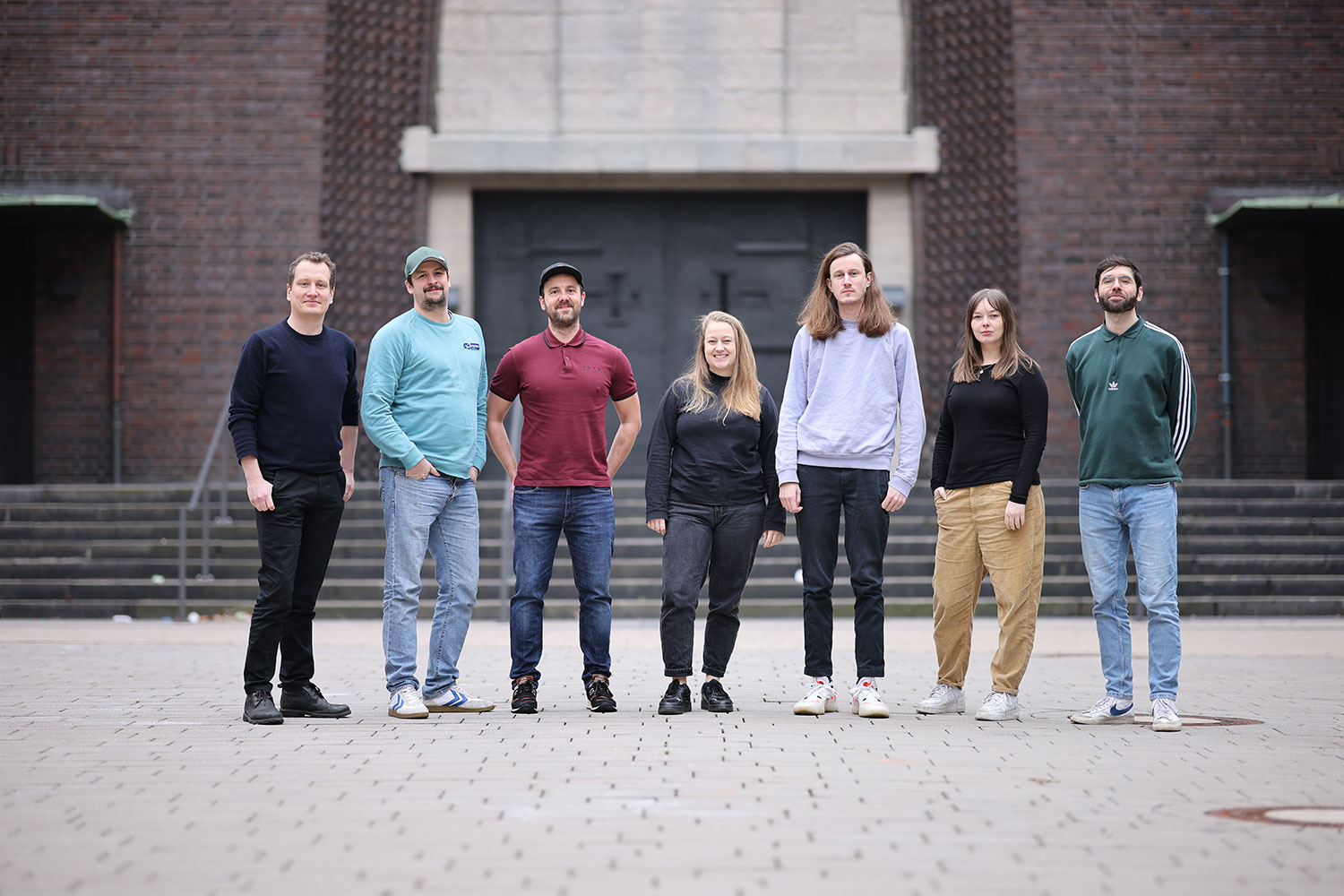Our Story
From neigbourhood project to showcase tech festival
In 2017, an idea took off that resulted in an event that is now one of the top virtual and augmented reality events in Germany. Matthias Krentzek and Roman Pilgrim developed their joint vision of a tech festival in the middle of the Ruhr area. Since its launch, the Places Festival has attracted thousands of visitors to Gelsenkirchen-Ückendorf. But what’s the secret of their success? In this interview, the two initiators reveal the origin of their idea, what inspires them and where they are heading with the festival.
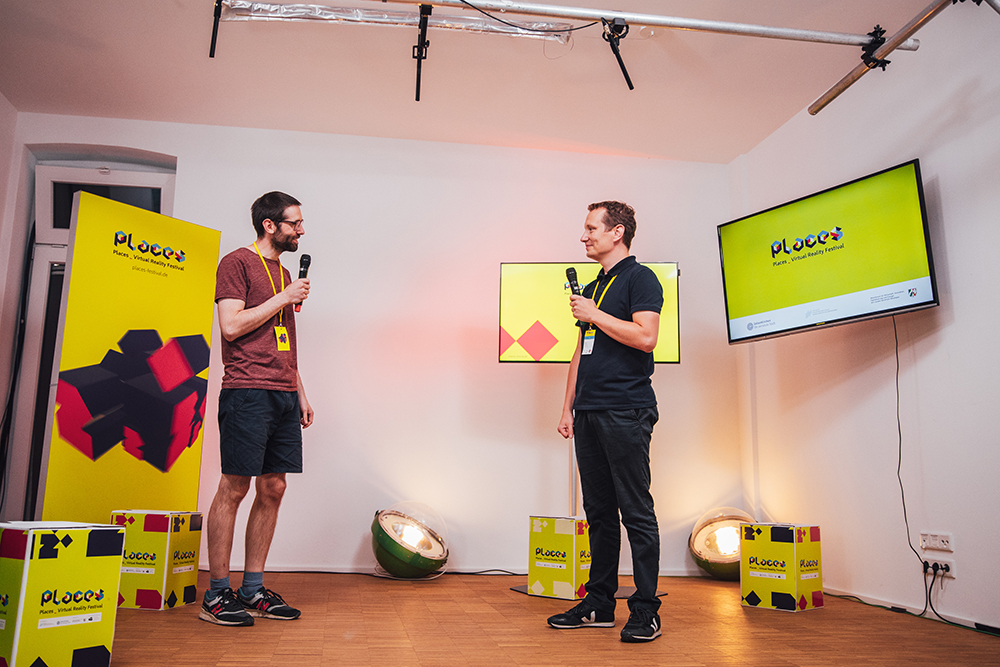
Matthias, Roman, what is the Places Festival and how did it come about?
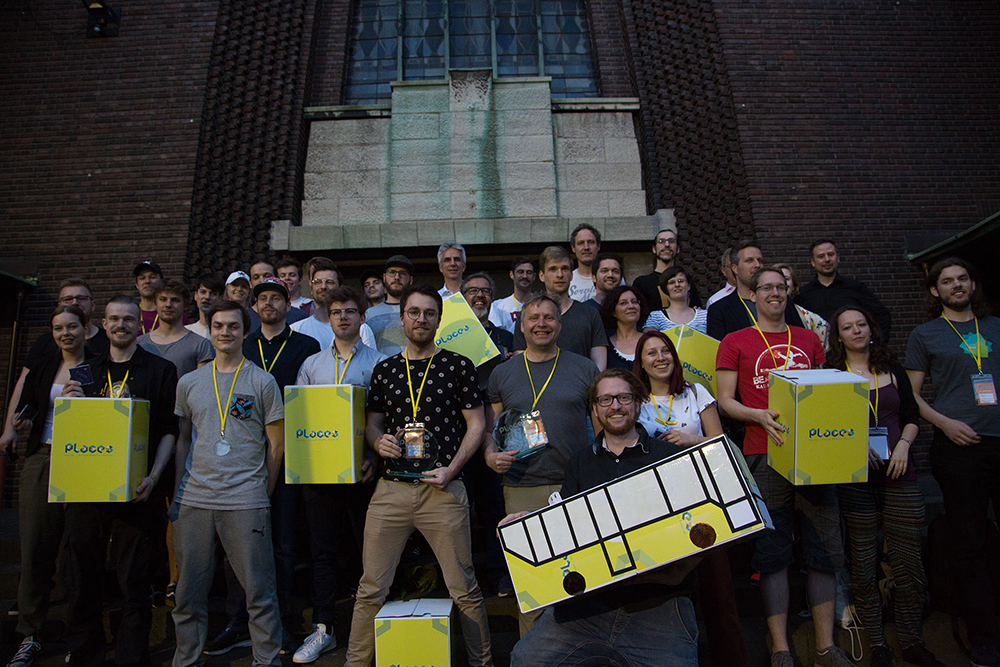
Matthias: We had the idea in 2017 when there was this huge hype around VR – at least in Germany. Admittedly, we had little idea of this exciting new technology at the time. But we knew that we wanted to bring this technology, which creates new places, into the neighborhood here. That’s still our mission, too. After that, we were overwhelmed by our own success. “Places” has become much bigger than we imagined in 2017.
I still remember very vividly how we presented the program at our very first press conference. Five camera crews were crammed into this tiny room. At that time, we were a very relatively small team. We often had to work through the nights. The whole thing then really exploded.
"Places" has become much bigger than we imagined in 2017.
Roman: Actually, the story starts even earlier. In 2016, the guys from VRoom founded their VR gaming arcade here on Bochumer Straße. As a result, the Economic Development Agency also became aware of the topic as part of the district development. I was approached in my role as urban developer at the time with the original idea of hosting VR pop-up days, but I was quickly thinking of something bigger: a VR festival. But I knew I would need help to pull this off. So I looked around our local creative club “Insane Urban Cowboys” for someone who fits the bill. I knew that Matthias would complement me very well with his structured work and would fit the project. But he probably didn’t know what he was getting into – and neither did I (laughs).
We quickly had a certain ambition for the whole thing, did a lot of networking and got to grips with it. In the process, we quickly got to know good people who gave us valuable tips and supported us along the way. We worked our tails off all night to create an event concept and pull a program out of the hat. That’s how Places 2018 became a success.
Explain again very briefly: What is the Places Festival in general and what makes it special?
Roman: Places Festival 2018 was Germany’s first freely accessible VR festival. We really wanted it to take place “on the street” at a lot of different locations – as the name suggests: Places! It was never supposed to be a trade fair – and I think that is a big part of its success. We invited program partners who normally stand in exhibition halls and have to pay exhibitor fees. Just as it was free for visitors, the festival was also free for program partners from day one. In 2018, we attached photos of a wide variety of locations to our Open Call. From a high-tech science park to a shell of a building, it was all there. We then wanted the people to tell us where they saw themselves and their application at the festival. The off-locations were received with great enthusiasm. That was the moment when we realized: We are on the right track.
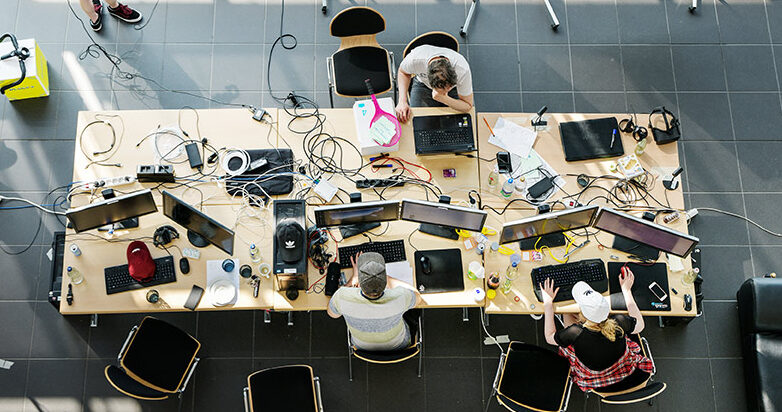
In April 2018, the time had come. The first Places Festival took place with a lot of motivation and commitment. Our team’s efforts were rewarded with good feedback, high media response and many visitors. From here on it went on. Is it possible to create even better exciting connections? Is it possible to generate even greater added value for society? And how can the path between consumer and business event be consistently followed?
What would you say is your goal with the event? What is your motivation?
Matthias: Two things are particularly important to us. One is the democratization of tech and future topics. What started with XR in general now relates to the huge buzzword “metaverse”. We believe it’s very important to address it now, before in 5 years the metaverse is there and so big that nobody has any influence on it anymore and everything is determined by big corporations. It was clear to us that this technology will have a major impact on all areas of the economy and life when it becomes established. That’s why we want visitors to be able to escape this consumer role and instead talk to the creators of the technology on an equal footing. As a goal, this is ambitious and a thick board that we want to drill. People in Germany are often said to have this “German Angst”. Everything that is new is initially rejected. That’s exactly where we want to start and instead arouse curiosity. Bring VR glasses and other technologies that people only know from television right here. To give them the opportunity to try things out and experience them for themselves.
Roman: In the beginning, we really wrestled with the question of whether we wanted to do a B2B or a B2C festival. But then we asked ourselves whether you really have to separate the two. Can’t an event like this be interesting for both groups and thus bring the XR scene together on the one hand and at the same time bring “normal” citizens into contact with the technology on the other? Our dream has always been that both the grandma next door and the businesswoman in costume can attend the same event and in the end both get something out of it.
Matthias: That is the second point which is important to us: We want to move the neighborhood and the city forward and prove that it is very possible to hold a festival here. Our regular guests have confirmed that this works. The unanimous feedback is that Places has a special atmosphere. It is important to us that we do not “conceal” anything, but that everything is very “real”, just as life is here. The atmosphere is urban and at eye level.
"Our dream has always been to have both the grandma next door and the businesswoman in costume attend our event at the same time!"
Roman: Of course, we also believe in this technology ourselves. When we put the glasses on for the first time, we were excited and curious at the same time. I am convinced that extended reality is the next big technology after the smartphone. Especially now that a player like Apple is entering the market.
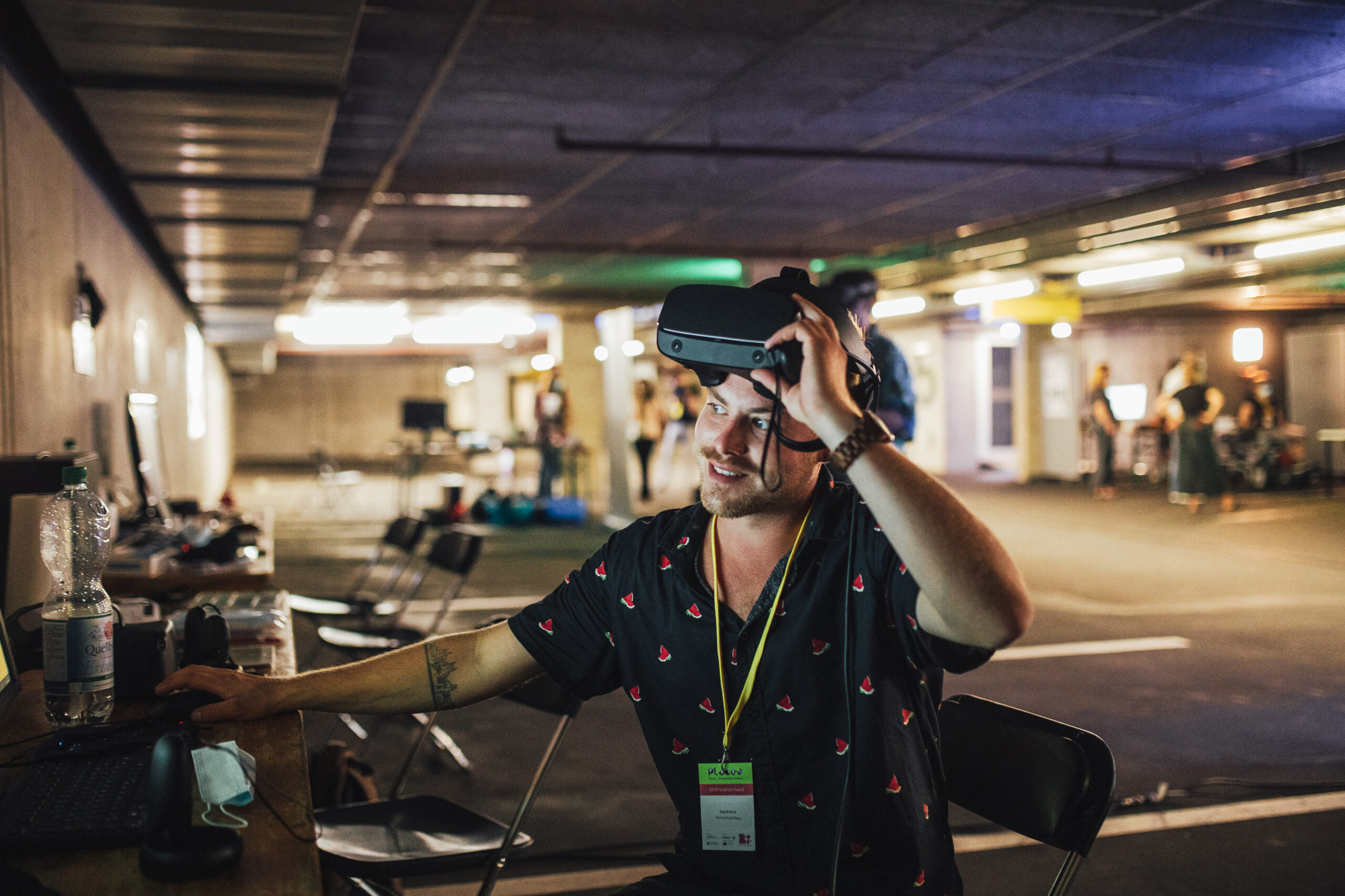
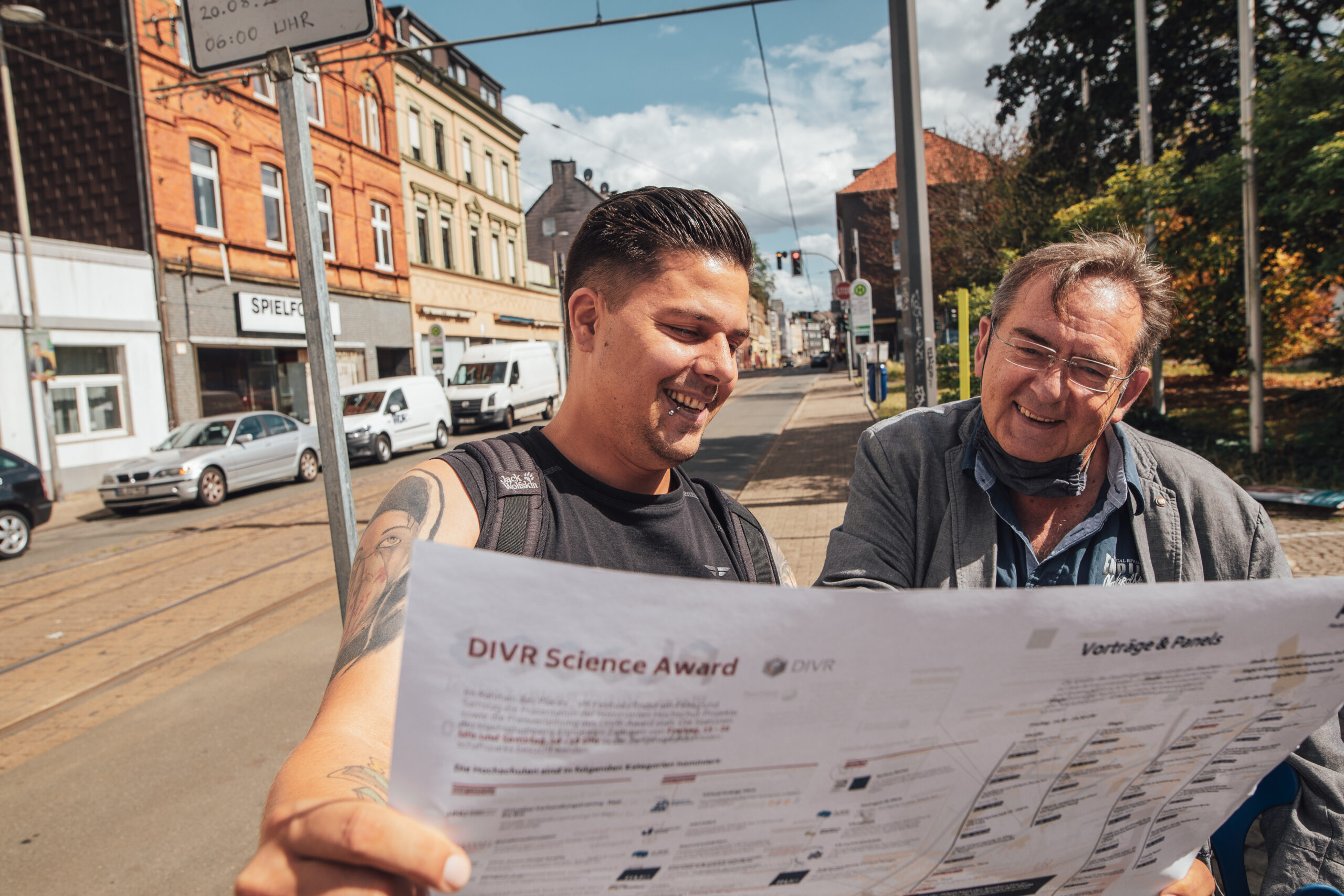
Curiosity is not only an important factor for the visitors of the event, but also for itscreators. Roman and Matthias don’t originally come from the XR industry at all, let alone the technology sector. While Roman has worked in the arts as well as in urban development and marketing, Matthias’ background is in communications consulting, design and project management.
What was it like coming into this XR scene as an "outsider"? What is your background?
Matthias: Well, it’s never been a secret that we were complete beginners when we started our journey into XR technologies in 2017, even though digital technologies have always played a role in our lives. Relatively quickly, we started to reach out to other people who had been involved in the field for much longer. In recent years, we have been able to delvemuch deeper into the topic. Curiosity has always been our driving force. We have tried to connect the project with our professional backgrounds. In Roman’s case, that’s urban development, which is inextricably linked to Places. In my case, it’s more communication – that’s also an important factor in an event like this, in addition to the technical stuff.
Roman: Exactly, our background is in marketing and communication, but for me it’s also art and culture. We are not a VR art festival, even though thatl always plays a part. To visitors, Places feels a bit like a cultural festival. We think that art and culture are a good way to bring the neighborhood forward again. Still, the economic aspect should not be forgotten either. This technology provides a boost for the city and promotes a spirit of entrepreneurship in Gelsenkirchen. Especially for the city of Gelsenkirchen, dealing with “new things” is important. This is also an aspect on which the cooperation with the Economic Development Agency is based. This technology provides an impetus and promotes the entrepreneurial spirit in the region. And this preoccupation with “new things” is particularly important for Gelsenkirchen and the Ruhr region.
Gamescom is at home in Cologne, CES in Las Vegas, SXSW is held in Austin and MWC invites its visitors to Barcelona. From this point of view, holding a tech festival in Gelsenkirchen seems courageous, to say the least. In the middle of the Ruhr area, in a district marked by structural change and real social problems. It’s not obvious why Germany’s biggest event for XR technology is taking place here in particular.
Why did you choose Gelsenkirchen-Ückendorf as the venue?
Roman: For the city of Gelsenkirchen, this was an opportunity to be involved in such an area at a very early stage. The location in Ückendorf was ideal for this. It is easy to reach by public transport for visitors, on site there are many flexible places to use and everything is within walking distance, so you can experience a lot in a short time.
For the city of Gelsenkirchen, this was an opportunity to be involved in such an area at a very early stage.
Matthias: That’s why it’s called Places. The different locations in the neighborhood and in 2024 in the whole city are important to us. But to avoid misunderstandings: Places is not a festival exclusively aimed at the residents of Gelsenkirchen. From the beginning, since 2018, we had more people from outside as festival visitors than from Gelsenkirchen. And now we also have visitors from abroad. We simply try to think in terms of society as a whole, according to the motto: Think global, act local.
How come the festival is free? Is no ticket needed at all?
Matthias: It is very important to us that everyone can afford to attend the festival. Everyone should be able to drop by spontaneously, completely barrier-free and without registration. We also don’t want to impose booth fees for our program partners like at a trade fair. Furthermore, we want to attract people who are still at an early stage with their XR project and who may not yet be on the market – those who are still experimenting.
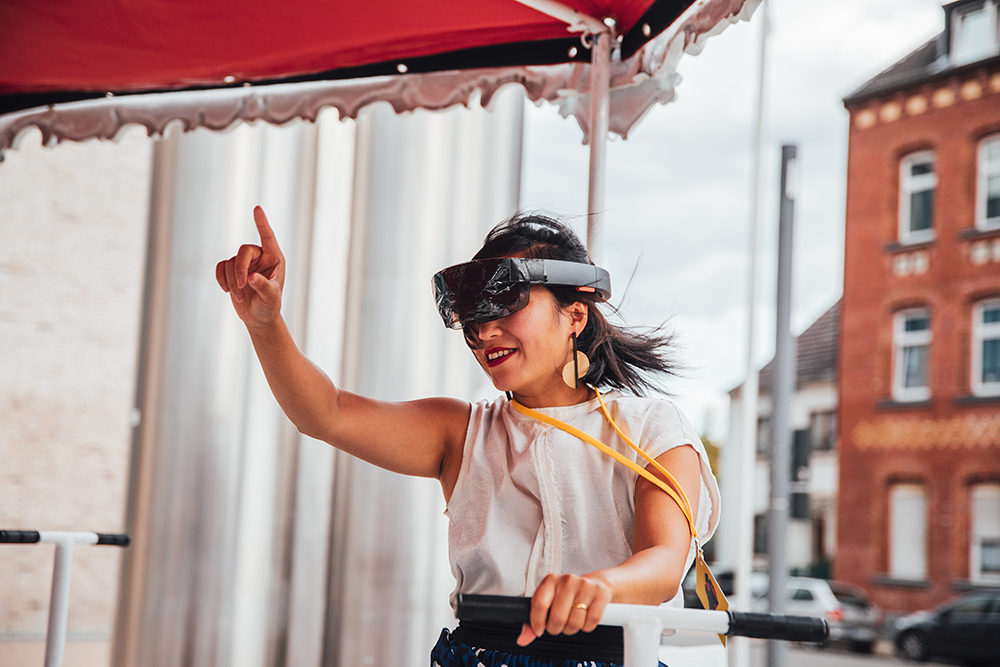
We are concerned with a collaborative thought.
Roman: From the beginning, we have been a platform that is shaped by the community. We provide the space, and the community shapes a lot of the content. For us, the community idea is at the heart of the festival.
Last but not least, one more question: What do you think will be different in 2024 compared to previous years? What can people expect?
Matthias: As already mentioned, we are growing beyond the Bochumer Straße neighbourhood. With individual XR Experiences and parts of the programme in Gelsenkirchen-Schalke and in the city centre, the event will also reach completely different people here locally – and at the same time offer our visitors the opportunity to experience even more exciting places in our city.
Roman: But we’re not just expanding in terms of location. The festival period has also been extended. The first parts of the programme, the XR exhibition FeVR-Pitches, will begin two weeks before the main visitor day. The core period of the festival is 10 days, culminating in a highlight day on 25 May. And even after that, you can continue to experience individual parts of the festival, such as the exhibition of our XR Art residents. As you can see: Places is not standing still, Places, like technology, is constantly evolving. We look forward to welcoming everyone who joins us on our journey into the future!
